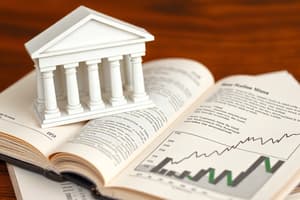Podcast
Questions and Answers
What does neoclassical economics view as necessary and desirable?
What does neoclassical economics view as necessary and desirable?
- Natural resources as the indispensable factor determining economic success.
- Constant economic growth as necessary and desirable. (correct)
- The relationship between supply and demand as having minor importance.
- A steady-state as the ultimate economic goal.
An example of an intangible resource is:
An example of an intangible resource is:
- A biogeochemical cycle
- Iron
- Sunlight
- Beauty (correct)
Resources that are obtainable from Earth but are present in fixed amounts are called:
Resources that are obtainable from Earth but are present in fixed amounts are called:
- Proven reserves
- Renewable resources
- Intangible resources
- Non-renewable resources (correct)
Using natural resources so as to be sustainable indefinitely requires:
Using natural resources so as to be sustainable indefinitely requires:
An object's external costs are the:
An object's external costs are the:
Goals for an efficient economy from an ecological perspective include all of the following except:
Goals for an efficient economy from an ecological perspective include all of the following except:
Ecology and economy are both derived from the Greek word 'Oikos' meaning:
Ecology and economy are both derived from the Greek word 'Oikos' meaning:
Natural capital is that which is created by:
Natural capital is that which is created by:
Which of the following is considered human capital?
Which of the following is considered human capital?
Which of the following is considered social capital?
Which of the following is considered social capital?
_______ is a nonrenewable resource.
_______ is a nonrenewable resource.
Renewable resources are those that:
Renewable resources are those that:
An example of an intangible resource is:
An example of an intangible resource is:
The economic theory that was originally focused on how the interests and values of individuals relate to larger societal goals is the ______ economic theory.
The economic theory that was originally focused on how the interests and values of individuals relate to larger societal goals is the ______ economic theory.
In economic terms, 'demand' is how much of something:
In economic terms, 'demand' is how much of something:
In economic terms, 'supply' is how much of something:
In economic terms, 'supply' is how much of something:
A(n) ________ relationship exists between supply and demand. Therefore, when supply is high, demand is _____.
A(n) ________ relationship exists between supply and demand. Therefore, when supply is high, demand is _____.
Flashcards are hidden until you start studying
Study Notes
Neoclassical Economics
- Views constant economic growth as essential and desirable.
Intangible Resources
- Beauty is an example of an intangible resource.
- Satisfaction also represents an intangible resource.
Non-renewable Resources
- Resources with fixed amounts obtainable from Earth are termed non-renewable, such as coal.
Sustainable Resource Use
- Sustainability requires harvesting natural products at rates not exceeding their natural replacement.
External Costs
- Defined as costs incurred by groups or individuals other than those directly using the product.
Efficient Economy Goals
- Efficiency from an ecological perspective emphasizes not maximizing growth but rather measuring progress through pollution reduction and valuing biological and cultural diversity.
Origin of Ecology and Economy
- Both fields derive from "Oikos," the Greek word for household, emphasizing their interconnectedness.
Natural Capital
- Created by natural Earth processes, highlighting the intrinsic value of ecosystems.
Human Capital
- Knowledge of history is identified as human capital, essential for societal development.
Social Capital
- Community organization exemplifies social capital, focusing on collaborative networks within communities.
Renewable Resources
- Resources that can renew themselves unless destroyed fall under renewable categories, critical for sustainability efforts.
Economic Theories
- Classical economic theory examines how individual interests and values correlate with broader societal goals.
Supply and Demand
- Demand quantifies how much consumers are willing to buy at current prices.
- Supply indicates the quantity of goods available in the market.
- An inverse relationship exists between supply and demand; when supply is high, demand is low.
Classical Supply-Demand Graph
- Demand peaks when prices are low, influencing overall market dynamics.
Studying That Suits You
Use AI to generate personalized quizzes and flashcards to suit your learning preferences.




